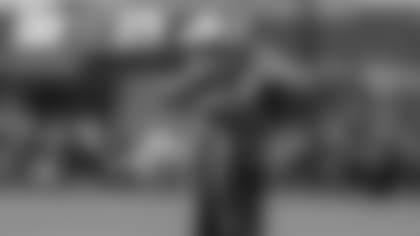Roger from Gillette, WY
From the Packers glory teams of the '60s, who besides Hornung was actually a high draft pick?
Hornung, Ron Kramer, Dan Currie, Herb Adderley, Dave Robinson, Donny Anderson, Jim Grabowski, Gale Gillingham and Bob Hyland were ones. Forrest Gregg, Jim Taylor, Bob Jeter, Ron Kostelnik and Tom Brown were twos.
Brian from Milwaukee, WI
Would you consider using a guest host for every episode of "Video Ask Vic"?
Only if you'll be the first.
Ed from Bloomington, IL
I'm a 50-year-old lifelong Packers fan and I love what you've done to packers.com. I can't believe I'm actually watching "Dancing With The Stars" because Donald Driver is on the show. Is this a mid-life crisis?
No, it would be a midlife crisis if you were watching DWTS because Peta Murgatroyd is on the show.
Dirk from Munich, Germany
What kind of player would you prefer at the OLB position, a speed rusher or a bull rusher? What fits the Packers best?
Speed fits everybody best. It's a speed game. Everybody wants speed. The Packers need more speed on defense.
Andy from Denver, CO
I can't help but think this is another year like 2009, and TT is going to make a bold move to trade up for an impact player. With Gurley and Borel both waiting in the wings for a spot on the roster at a crowded position, what do you think the chances are James Jones gets included in a draft-day trade?
I think what you're saying is that you can't help but HOPE this is another year like 2009, and you're trying to find ways to convince yourself it can happen. I think Jones is a talented guy a lot of teams would love to have on their roster, but draft picks have long been treated as pieces of gold; teams are much more willing to trade players for picks than they are picks for players, so finding a pick-for-player trade partner is difficult. Players, not plays, and picks, not players.
Alex from New York, NY
Can you explain what you mean by there being no off the record? I think I understand what you mean when you say reporters and players have to develop a trust, but why do other reporters refer to off the record?
First of all, if you accept information off the record, your sources are likely to qualify everything they tell you with, "This is off the record." The next thing you know, the final score of the game will be off the record. Secondly, you can't run the risk of agreeing to receive a piece of information off the record and not being able to compete with another media outlet that has received that information on the record. Thirdly, if you ever break that off-the-record trust, your relationships in that locker room are likely to dry up very quickly and you're out of business. If you want to establish yourself in the locker room for the long haul, and not as a hit-and-run reporter, you need to establish relationships the honorable way. Your sources need to know you will use what you get but you will use it responsibly. When you establish that kind of reputation as a reporter, you'll develop sources that will give you dependable information. They'll see you as the guy they want to write the story.
Victor from Charleston, WV
I understand the importance of a perfect RB, but when perfect is not available, is it best to focus on speed, agility or strength?
Speed, speed, speed; always go for speed. The barn is full of plow horses.
Thad from Chesterfield, VA
Do you think a GM and head coach should be one person or is a separation better?
The jobs are too big in today's game to combine. If the head coach is also the GM, then who's going to conduct the Tuesday workouts when the head coach is game-planning? Coaches coach, scouts scout, players play, etc. The days of, "If they want you to cook the dinner, they should let you shop for some of the groceries," are over. The cooking part and the shopping part are each too demanding for one person to do both.
Mark from Winfield, IL
Vic, the other day you responded to an email from someone looking to better himself that you'd never been asked that question before. Any other memorable never-been-asked-before questions from your years of experience?
I had a player once ask me if I had played quarterback at Florida State. I stared at him, waiting for the punch line. Leon Searcy was sitting at the adjacent locker and he stared, too, waiting for the punch line, which never came. When we realized the player was being serious, Leon dropped to the floor in laughter. He never let his teammate forget his faux pas.
Hans from Front Royal, VA
Most of us do what we are good at in order to pay the bills, but there's something else we'd rather be doing. If you weren't a sports writer, what would you be?
I honestly don't know, but I'm absolutely sure I would be a failure at it. One summer working in a sintering plant taught me I needed to work harder at becoming a sports writer.
Kamal from Novi, MI
Remember when one of your catch phrases was, "The quarterback must go down and the quarterback must go down hard"? Maybe Goodell should interview you as part of "Bounty Gate."
I have a confession to make; I should've done this long ago. I am part of the culture that needs to be changed. I understand the need for the game to evolve into something safer, it's just that I have long equated football with toughness and, in my mind, toughness has always been represented by the ability of a man to deliver and absorb a blow, physically and emotionally. That's the culture that has to be changed. We have to think in different terms; I have to think in different terms. I'm trying to change; I really am.
Mauricio from Chihuahua, Mexico
What would you say if the first-round pick of Green Bay is a DE and the second-round pick is a CB or LB?
I'd say the Packers will have been fortunate that need and value met.
Tucker from San Antonio, TX
Vic, in the early '90s, the Cowboys employed a draft-day trade system in which they gave a numerical weight to the pick and so on. That way, when a team offered them a trade involving picks on draft day, they were able to do simple math and determine the worth of the pick. Does a similar system still exist today?
It's called a numerical table and every team uses one of some sort. I'm not big on numerical tables. I think they tell us nothing more than what we know going into a trade: The team trading back is likely to win the points battle, or why would the team trading back agree to the deal? It's the only reason for trading back; acquiring value. There have been times that hasn't been the case. If I remember correctly, Baltimore might have lost the points battle in trading back to draft Joe Flacco, but he's a guy they had targeted and he's a quarterback and that meant they were going to have to pay him a lot of money, which meant moving back to where he fit was more important than winning a points battle. Common sense always prevails. When you decide to trade up, the points aren't the big consideration; the player for whom you're trading up is the concern. You better hit on him because trading up is usually costly. The Packers targeted Clay Matthews and hit a home run. The Steelers targeted Troy Polamalu and hit a home run. The Jaguars targeted Derrick Harvey and didn't hit a home run.
Roy from Eagle River, WI
Heard a great quote from Brian Billick: "Need is a terrible evaluator." Did he get that from you?
That's a good one; he didn't get it from me. Here's one I invented, I think: "Hunger doesn't count calories."
Vidar from Malmo, Sweden
If I'm looking for an offensive tackle on the second draft day, who am I looking at?
Mike Adams, Bobbie Massie, Zebrie Sanders, Brandon Mosley and Mitchell Schwartz are all second-round prospects, each of whom has a chance to sneak into the first round. This is a down year for tackles and need-picking teams are likely to reach for one or two of those guys. After that group, the talent thins considerably and it's difficult to forecast who the next tackles selected will be.
John from Duluth, MN
I started in journalism and did not want to spend my Wednesday nights attending high school volleyball games. No NFL gig for me. I agree a good romantic lead thrills the senses, unlike a technical lead, but you know romance can't be forced; it's serendipitous. What's the best lead you've written?
I can only remember one: "He was my friend."
Joel from Medford, WI
I am writing a research paper about Vince Lombardi's contributions to pro football. What do you think were his biggest contributions?
I think his biggest contribution is his personality. It became a benchmark for the times in which he coached. He's a reference point in the game's evolution, and it's not so much for his victories as much as it is for his overwhelming personality. He became a symbol of the game, and now that "game" is leaving us and, as a result, the Lombardi legend will only grow stronger. Generations from now will wonder who was he and why was he like he was? He was one of those fortunate people success graced with the luxury of only ever having to be himself.
Christopher from Madison, WI
The draft was reduced to 12 rounds in 1977, to eight rounds in 1993, to seven in 1994. Isn't college football producing more talent at more schools across America than it ever has?
No, it absolutely isn't. There are fewer schools playing big-time college football now than there were when I was young, and the recruiting restrictions have reduced the draft pool by thousands every four years. Marquette, for example, played major college football. Once upon a time, schools could recruit as many players as they wished. Nebraska's redshirt team would probably compete for a national championship in today's college game. The Friday night freshman game drew big crowds. I think I've written about attending a Pitt-Notre Dame freshman game when I was young. It packed Forbes Field and the game ended on a blocked field goal attempt and return for a touchdown that won the game. It's one of the most memorable games I've ever attended. Football was the college game, and pro football was college football's ugly stepchild. This is not the golden age of college football.
Dominick from Chicago, IL
Why hasn't Bruce Irvin showed up in the first round of any mock drafts I've seen?
He'll be a little reachy for a team picking him because Irvin was a part-time player at West Virginia last season. WVU uses a 3-3-5 defense that didn't suit Irvin's skills. He had to play defensive end and that meant getting locked up with big offensive linemen and he just didn't have the size and stamina to do that all game long. He's likely going to be a much better player in a 34 than he was in WVU's 33, but he still represents an element of risk because teams don't have tape of him doing what they're going to be asking him to do.














